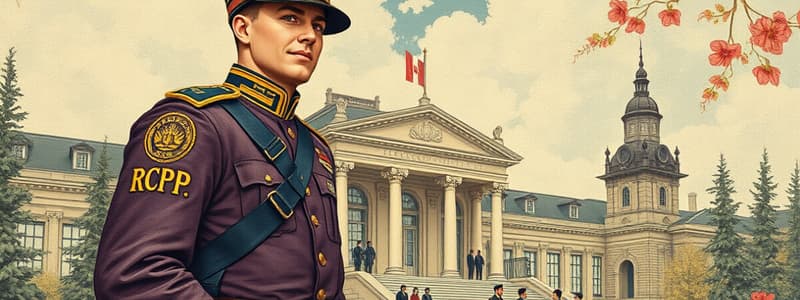Podcast
Questions and Answers
Which of the following jurisdictions does not have municipal police services?
Which of the following jurisdictions does not have municipal police services?
- British Columbia
- Ontario
- Alberta
- Nunavut (correct)
What is the primary function of the criminal justice system?
What is the primary function of the criminal justice system?
- Social control (correct)
- Rehabilitation of criminals
- Punishment of offenders
- Deterrence of crime
Which of the following best describes mala in se laws?
Which of the following best describes mala in se laws?
- Laws that are universally accepted across all societies
- Laws that are considered immoral and inherently wrong (correct)
- Laws that prohibit specific behaviors as defined by statutes
- Laws that are enacted for the sake of public safety
Which court is known as the provincial court in Ontario?
Which court is known as the provincial court in Ontario?
Which entity is responsible for the enforcement of laws created by Parliament in Canada?
Which entity is responsible for the enforcement of laws created by Parliament in Canada?
What does substantive justice primarily focus on?
What does substantive justice primarily focus on?
Which of the following is an example of contextual discrimination?
Which of the following is an example of contextual discrimination?
What constitutes a Level 2 sexual assault?
What constitutes a Level 2 sexual assault?
Which of the following is NOT considered an excuse defence?
Which of the following is NOT considered an excuse defence?
Which principle emphasizes that no one is above the law?
Which principle emphasizes that no one is above the law?
Study Notes
Provinces/Territories without Municipal Police Services
- Newfoundland and Labrador, Nunavut, Northwest Territories, and Yukon rely on the RCMP for law enforcement.
Royal Canadian Mounted Police (RCMP)
- Organized under the RCMP Act, the RCMP operates within the Ministry of Public Services and Emergency Preparedness.
- Federal authority enforcing laws created by Parliament.
Court System
- Lower Courts: Known as provincial courts; Ontario has the Ontario Court of Justice (OCJ), and Quebec has the Court of Quebec.
- Superior Courts: Referred to as the Supreme Court or Court of Queen's Bench; Ontario calls it the Superior Court of Justice, while Quebec uses the Superior Court designation.
- Nunavut operates with only one level of trial court.
Government Corrections Responsibilities
- Provincial and territorial governments handle individuals serving under two years and those with non-custodial sentences like probation.
- The federal government, through the Correctional Service of Canada, manages adults sentenced to two or more years.
Definitions of Crime
- Violates a criminal law within its jurisdiction or is determined guilty by a court representative (e.g., judge, jury) through a "black letter" approach.
- Mala in se: Crimes considered immoral and inherently wrong (e.g., murder).
- Mala prohibita: Crimes that are prohibited by law rather than moral wrongdoing (e.g., assisted suicide).
Assisted Suicide
- Medical Assistance in Dying Law enacted in 2016.
- The criminal code's section on assisted suicide was challenged for violating Charter rights (sections 7, 12, and 15(1)); deemed necessary for societal protection in the Rodriguez case.
Criminal Justice System Dynamics
- Primary function of criminal justice serves as social control.
- Adversarial system involves roles like prosecutor and judge ensuring substantive justice (truthfulness) and procedural justice (legitimacy of decisions).
- The Anti-Terrorism Act allows federal government to bypass certain procedural justice aspects in national security cases.
Rule of Law
- All society members must adhere to laws without exceptions.
- Elements of rule of law include no privileged exemptions, clarity and public accessibility of laws, and fairness within legal institutions.
Discrimination and Contextual Factors
- Contextual discrimination arises from organizational policies within criminal justice agencies.
Sexual Assault Classifications
- Level 1: Hybrid offence.
- Level 2: Involves weapon use or threats; may result in bodily harm.
- Level 3: Severe harm that endangers life.
Defences in Criminal Law
- Excuse Defences: Include age, mental disorder, mistake of fact, mistake of law, and automatism (involuntary behavior).
- Justification Defences: Cover duress, necessity, self-defense, provocation, and entrapment.
Sources of Criminal Law
- Constitutions, statute laws, case laws, and administrative procedures guide the framework of criminal law.
Rights of the Accused
- Rights include silence, evidence disclosure, and the right to make a full answer and defence.
Studying That Suits You
Use AI to generate personalized quizzes and flashcards to suit your learning preferences.
Description
Test your knowledge about the provinces and territories in Canada that lack municipal police services. This quiz will also explore the role of the RCMP and the structure of the court system in Canada, including lower and superior courts. Challenge yourself to learn more about the enforcement of laws and legal jurisdictions.



